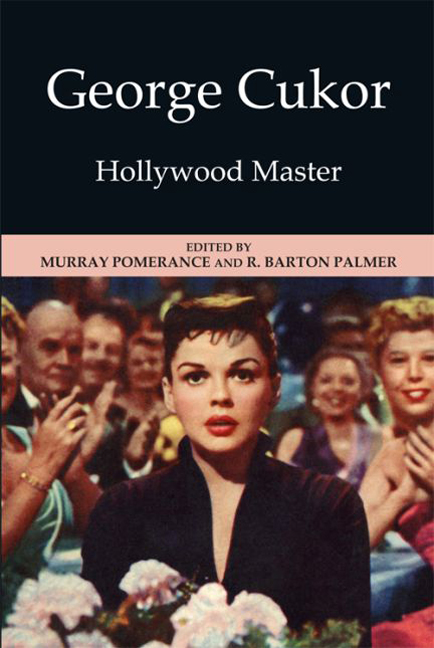Book contents
- Frontmatter
- Contents
- List of Figures
- List of Contributors
- Acknowledgments
- Introduction
- 1 Cukor's Tragicomedies of Marriage: Dinner at Eight, No More Ladies, The Women, and The Marrying Kind
- 2 George Cukor's Late Style: Justine, Travels With My Aunt, and Rich and Famous
- 3 Libel, Scandal, and Bad Big Names: It Should Happen to You, Les Girls, Camille, and Romeo and Juliet
- 4 The Cukor “Problem”: David Copperfield, Holiday, and The Philadelphia Story
- 5 Modulations of the Shot: The Quiet Film Style of George Cukor in What Price Hollywood?, Born Yesterday, Sylvia Scarlett, and My Fair Lady
- 6 Doubling in the Cinema of George Cukor: The Royal Family of Broadway, A Bill of Divorcement, A Double Life, and Bhowani Junction
- 7 George Cukor and the Case of an Actor's Director: Hepburn and/or Tracy in Little Women, The Actress, Keeper of the Flame, Adam's Rib, and Pat and Mike
- 8 Cukor Maudit: Tarnished Lady, Girls About Town, Our Betters, Susan and God, Desire Me, Edward, My Son, The Model and the Marriage Broker, Let's Make Love, and The Chapman Report
- 9 George Cukor's Theatrical Feminism: Gaslight, Heller in Pink Tights, A Life of Her Own, and A Star is Born
- 10 The Furthest Side of Paradise: Two-Faced Woman, A Woman's Face, Hot Spell, Wild is the Wind, and Winged Victory
- Works Cited and Consulted
- Index
4 - The Cukor “Problem”: David Copperfield, Holiday, and The Philadelphia Story
Published online by Cambridge University Press: 07 October 2017
- Frontmatter
- Contents
- List of Figures
- List of Contributors
- Acknowledgments
- Introduction
- 1 Cukor's Tragicomedies of Marriage: Dinner at Eight, No More Ladies, The Women, and The Marrying Kind
- 2 George Cukor's Late Style: Justine, Travels With My Aunt, and Rich and Famous
- 3 Libel, Scandal, and Bad Big Names: It Should Happen to You, Les Girls, Camille, and Romeo and Juliet
- 4 The Cukor “Problem”: David Copperfield, Holiday, and The Philadelphia Story
- 5 Modulations of the Shot: The Quiet Film Style of George Cukor in What Price Hollywood?, Born Yesterday, Sylvia Scarlett, and My Fair Lady
- 6 Doubling in the Cinema of George Cukor: The Royal Family of Broadway, A Bill of Divorcement, A Double Life, and Bhowani Junction
- 7 George Cukor and the Case of an Actor's Director: Hepburn and/or Tracy in Little Women, The Actress, Keeper of the Flame, Adam's Rib, and Pat and Mike
- 8 Cukor Maudit: Tarnished Lady, Girls About Town, Our Betters, Susan and God, Desire Me, Edward, My Son, The Model and the Marriage Broker, Let's Make Love, and The Chapman Report
- 9 George Cukor's Theatrical Feminism: Gaslight, Heller in Pink Tights, A Life of Her Own, and A Star is Born
- 10 The Furthest Side of Paradise: Two-Faced Woman, A Woman's Face, Hot Spell, Wild is the Wind, and Winged Victory
- Works Cited and Consulted
- Index
Summary
Here's the Cukor problem in a nutshell:
In 1962, Andrew Sarris asserted that one of the auteur theory's central prem¬ises “is the distinguishable personality of the director … Over a group of films, a director must exhibit certain recurring characteristics of style which serve as his signature” (Sarris, Primal Screen 50). In a long interview with Peter Bogdanovich, however, Cukor insisted that a director “should remain unostentatious; because if you do a lot of fancy footwork, maybe they notice you as a director, but I think it hurts the story … I think one should not be aware of technique of any kind” (Bogdanovich 445, 449).
Cukor, in other words, was a good citizen of Hollywood's invisible-style regime, which assumed the primacy of star and story. And when he worked in comedies, his stylistic “signature” seemed to retreat even further from view. V. F. Perkins has argued that with comedy,
the picture exists solely for what it shows and we gain nothing by attempting to interpret its structure. Its qualities as an image are submerged in its function as a document … That is why the great comedies, with their insistence on action and their indifference to cinematic elaboration, have proved difficult to assess within the terms proposed by traditional film theory. (Perkins 98)
And yet, Cukor made good comedies, and other important directors (George Stevens, for example) did not.1 If Cukor seems to fall into the same category, we might recall that he abandoned the theater for the reason he gave Bogdanovich: “I think the role of a stage director is not terribly interesting, whereas a movie director's job is much more interesting, much more comprehensive and he affects the work much more” (Bogdanovich 442).
Cukor thought he was doing something, and he thought that what he did affected his movies. But detecting that something, which involves recovering the decision-making behind his films’ transparent surface, proves more difficult than with a more “ostentatious” director like John Ford. Adrian Martin has noted that film criticism “favours those genres (film noir, horror, romance, melodrama) … that trade in what I would call eyeball subjectivity … It is far less interested in film styles marked by a certain everydayness” (Klevan Disclosure 64).
- Type
- Chapter
- Information
- George CukorHollywood Master, pp. 60 - 76Publisher: Edinburgh University PressPrint publication year: 2015



